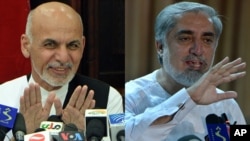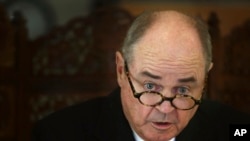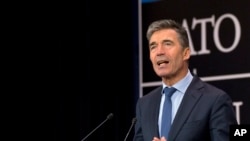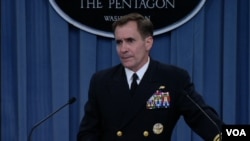President Obama has intervened in Afghanistan’s disputed presidential election urging the two candidates to shun violent or extra-constitutional means or face a cut-off of U.S. assistance. U.S. officials, while acknowledging serious fraud allegations, are calling for quick implementation of auditing measures to pave the way for a new, legitimate government and a post-NATO bilateral security agreement.
Obama, speaking with former Afghan foreign minister Abdullah Abdullah Monday and former finance minister Ashraf Ghani Tuesday, stressed the United States expects a thorough review of all reasonable allegations of fraud from the June 14 runoff vote. He called on all parties to avoid steps that undermine Afghanistan’s national unity, saying there is no justification for resorting to “violent or extra-constitutional means” and warning that would result in an end of U.S. assistance to Kabul.
U.S. State Department spokeswoman Jennifer Psaki says such a cut-off of aid is not considered a threat.
"That statement was in response to the fact that there have been reports on the ground of plans to declare victory, to create a parallel government. Both of those steps would be illegal. And, it’s not a threat. It’s a fact that certainly we wouldn’t be able to provide the kind of support that is our preference to provide if those types of steps were taken," she said.
Stalemate
The Special U.S. Representative to Afghanistan and Pakistan, James Dobbins, says Afghanistan has made tremendous progress over the past 13 years and describes the idea of a parallel presidency as destructive. In an interview with VOA, the diplomat said the United States wants to see the stalemate between the two candidates resolved and political discussions between the parties to continue. He said Washington and its partners would not be able to support a divided Afghanistan at odds with itself.
"Clearly if either or both of these efforts fail Afghanistan would be badly divided and this would have a very deleterious affect on the prospect for peace and prosperity in that country and for the continued commitment of, not just the United States, but the entire international community," said Dobbins.
Preliminary results from the run-off election have Abdullah losing to Ashraf Ghani by one million votes. But, Abdullah said Tuesday he is the winner "without any doubt," and vowed to never accept what he called a "fraudulent government."
RAND Corporation South Asia analyst Jonah Blank says, from Abdullah’s perspective, this is not an unreasonable position to take:
"He feels as if he lost the 2009 election due to fraud, and he feels he bowed out in 2009 for the good of the country," he said. "In this case, he also feels that he is losing on the basis of fraud and he’s doing everything that he can to change the narrative to avoid, as he sees it, a victory for him that was snatched away by fraud."
Fraud investigation
Jen Psaki says Afghanistan’s electoral commission and the complaints commission need to examine all such allegations of fraud.
"There are serious allegations. They need to be looked into. There needs to be a review of all the ballots that may or may not be legitimate," she said. "There are also some U.N. proposals that we think the electoral body should be working with them on. And, at the same time, the candidates and their supporters need to be in conversations with each other about the formation of a government of national unity and a government that includes all of the relevant parties and important groups. And, we feel both of those steps are important moving forward."
US diplomacy
There are reports that Secretary of State John Kerry, currently in Beijing for a U.S./China Economic and Strategic Dialogue, may travel to Kabul Friday. Dobbins said Kerry will want to meet with both candidates and try to work with them to see whether both the formal process of examining the ballots and determining the results of the election can go forward in a mutually agreed fashion.
As for a bilateral security agreement yet to be signed by the United States and Afghanistan, NATO Secretary-General Anders Fogh Rasmussen said Tuesday the BSA must be signed by September or maintaining a force beyond 2014 when the NATO combat mission ends will be problematic. White House spokesman John Earnest said the agreement is in the best interest of both American national security and the people of Afghanistan:
"For them to sign this agreement, the election needs to be concluded, and because of the concerns that have been raised about fraud, the conclusion of that election is being drawn out a bit," he said. "Fortunately, there is in place a series of procedures to adjudicate concerns about fraud, and we have sought through diplomatic channels to encourage both sides to allow that process to work. And, we’re hopeful that both candidates and their supporters will continue to support that process as it moves forward."
Security arrangements
Pentagon spokesman Rear Admiral John Kirby Tuesday said the electoral dispute is not affecting the US/Afghan security relationship.
"This is the first democratic transition of power in Afghanistan’s history," he said. "It’s historic on an epic scale. And, yes, there are complications. We’re certainly monitoring that and watching that, and encouraging both candidates to let the process continue. It doesn’t do anybody any good to threaten violence. We want to get a complete audit of the votes, the second round returns before any kind of formal announcement is made one way or the other. We’re not picking sides here. The only side we’re on is the side of the Afghan people, and I think we just need to keep focused on that. And, there’s absolutely no change in our commitment to the peaceful, stable future of Afghanistan."
Diplomat James Dobbins says, while he would have preferred withholding the election’s preliminary results until further audit measures were in place, he urges both candidates to quickly accept proposed UN auditing measures so the process can be completed in time for an August 2nd inauguration of Afghanistan’s next president. He says what is crucial is a legitimate election result and a government that represents the major elements of Afghan society.



